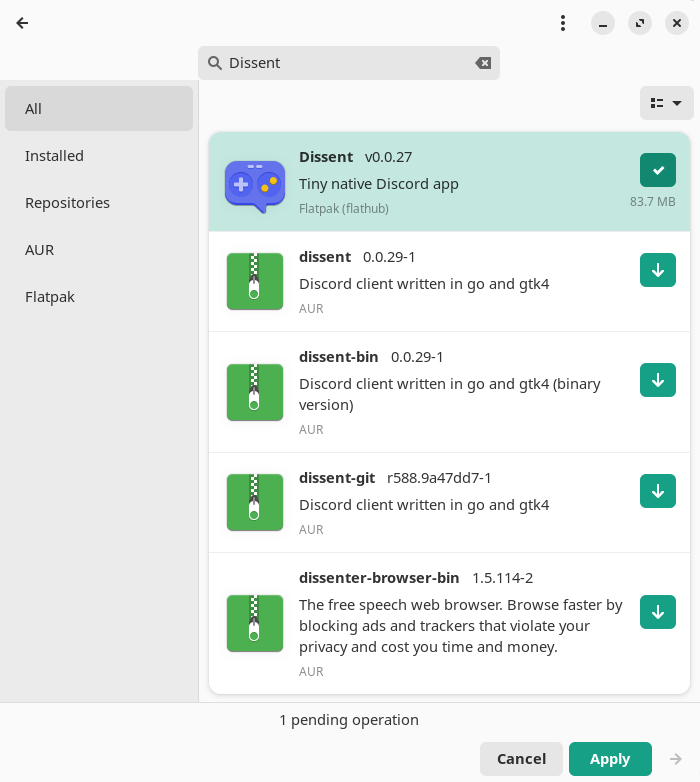Discord is a proprietary freeware voice-over-Internet Protocol (VoIP) application designed for gaming communities. The software specializes in text and audio communication between users in a chat channel. The key word in the opening sentence is freeware.
But if you prefer open source software on your system there’s a viable alternative. It’s called Dissent (previously known as gtkcord4). This third-party Discord GTK-based client bills itself as a “smooth, native experience on Linux desktops”.
Installation
We evaluated Dissent using Manjaro, an Arch-based distro, as well as the ubiquitous Ubuntu.
With Manjaro, Pamac (Manjaro’s front-end installation tool) lets us install Dissent from a Flatpak, or with the Arch User Repository (AUR).

Flatpak is not our preferred method of installation, but it makes the process very simple, and it’s distro-agnostic.
Next page: Page 2 – In Operation and Summary
Pages in this article:
Page 1 – Introduction and Installation
Page 2 – In Operation and Summary


I am not a proprietary-software supporter and so Discord is not my fancy.
However, I recognise that they have a right to decide their own Terms and Conditions.
If this software, Dissent, is in breach of those terms (and thus of the law), why are you advertising here?
We have so many valid opensource alternatives, and such a diverse ecosystem built on then. Starting from Matrix, for example. But also, albeit slightly different, Mastodon, Nostr etc etc.
It’s never clear cut Gio. Breaching terms of service is not necessarily a breach of a law. For example, in many countries failing to abide by terms of service does not give a company a right to enforce unreasonable terms.
The fact there are alternatives to Discord makes not a jot of difference if you need to access their service e.g. if a gaming community has chosen to use Discord.
The comment about ToS simply repeats the developer’s disclaimer.
A huge amount of benign open source software can be used for unlawful purposes. But that’s not a reason, in itself, to exclude them. And breaching an organization’s ToS is not automatically a breach of any law.
Users make their own decision whether to use a particular app or service.
Countries often ban services. Discord itself is banned in Oman, Iran, China, UAE and North Korea. Should we not cover a service because it’s illegal to use in a minority of countries?
Valid points Steve.
Getting caught using Discord in those countries probably results in a prison sentence. Probably worse in North Korea.
While a few countries ban Discord, that’s not a reason to exclude Discord from LinuxLinks. Some people hate services/software which is not open source. That’s a personal preference and should not be imposed on others. I’m more than happy to use proprietary software.
Re a potential breach of ToS, what’s the worst that could happen? Ultimately, Discord could ban someone if they breach the ToS. Suing them? Well only if they caused harm to Discord. Say if they lost money e.g. by DoS. But using an unofficial app is not going to cause Discord any financial loss. And there are tons and tons of unofficial apps for different services, all in the same position which potentially might breach a ToS.